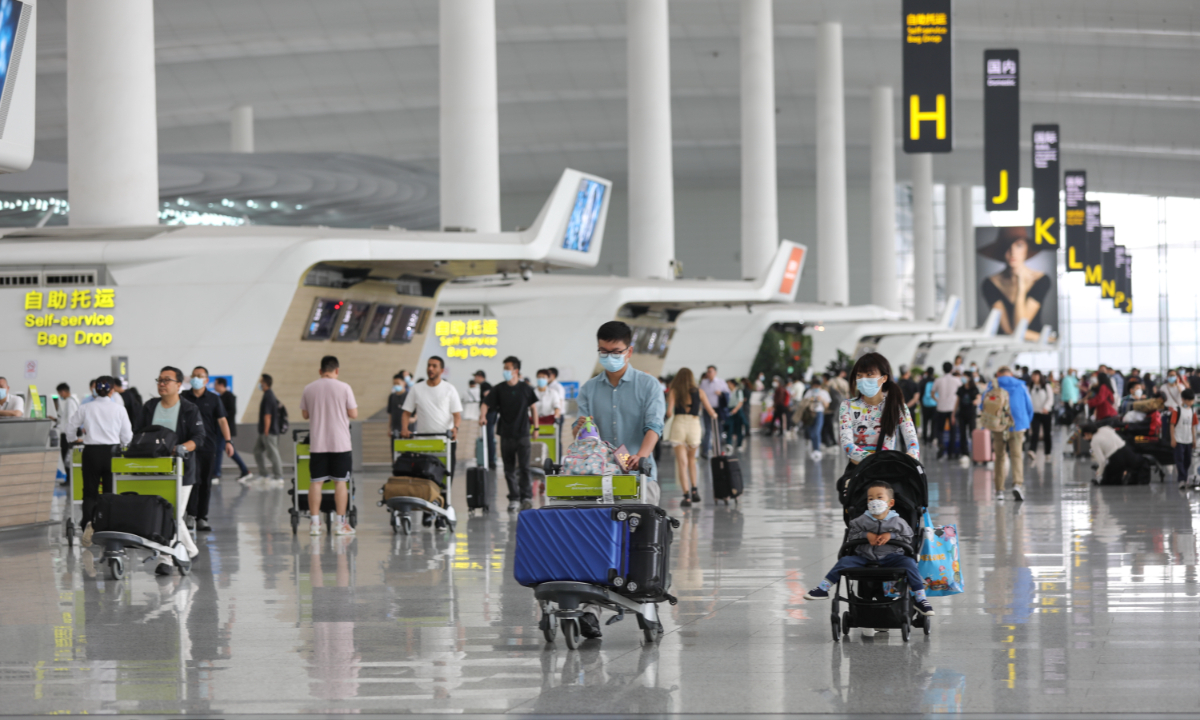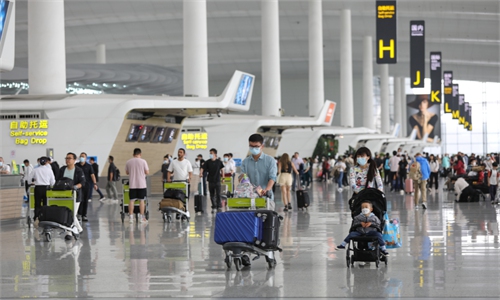Chinese experts hail end to COVID global health emergency, urge long-term monitoring

Passengers wait at Guangzhou Baiyun International Airport on April 29, 2023, the first day of the five-day May Day holidays. Photo: Courtesy of Guangzhou Baiyun International Airport
After the World Health Organization (WHO) on Friday declared an end to COVID-19 as a global public health emergency, many Chinese medical experts expressed optimism for further social and economic recovery, while stressing a necessity for long-term monitoring of the virus in the new stage of epidemic prevention.
The end of COVID-19 as a global health emergency means that countries no longer need to implement corresponding social public health measures and prevention and control measures, which will bring new changes to global and China's transportation, trade and tourism landscape, said Liang Wannian, head of China's COVID-19 response experts' team.
A range of recent indicators point to a new balance between natural immunity and the virus being formed; in other words, global COVID-19 has achieved important progress, Liang said in an interview with China Media Group on Saturday.
The global fight against the COVID-19 pandemic has achieved important progress, and there will be new changes in many fields that further benefit social and economic development and international exchanges, Liang said.
"This is further conducive to social and economic development and international exchanges, and further reduces some inconvenience caused by the epidemic," Liang said, adding that countries will have more energy and time to focus on economic development and improving living standards.
Liang, who leads the expert panel of COVID-19 response of China National Health Commission, further explained that the end to COVID-19 as a global health emergency does not mean the epidemic will disappear, nor the harm caused by the disease, but it means that countries now have the ability to effectively control the harm.
Prevention and control measures such as monitoring and early warning still need to be maintained, especially vaccination for high-risk groups and key groups, Liang noted.
Many medical experts have expressed similar sentiments to that of Liang after the WHO declared an end to COVID-19 as a global health emergency.
"The virus will still exist, but the COVID-19 pandemic is over, and return to normalcy feels great," reads a message posted by Shanghai-based renowned infectious disease expert Zhang Wenhong on Saturday.
Chen Xi, associate professor of health policy & economics at Yale University, told the Global Times that at present, the threat of the virus to people's life and health and the medical system has not been reduced to a "tolerable level," citing that the weekly death toll from the COVID-19 in the US is still more than 1,000, more than many other diseases.
Countries around the world still need to cooperate to monitor the mutation of the virus, a threat that needs long-term attention, Chen said.
"The WHO announcement ending the COVID-19 emergency is based on its approval of global pandemic control situation with positive development, sending signals that things are returning to normal," a Beijing-based medical expert, who requested not to be named, told the Global Times on Saturday.
There is little possibility of large-scale rebound of pandemic, given factors including the current warm weather in the northern hemisphere and broad public experience in combatting the virus, the expert predicted.
However, the Chinese public should remain alert and monitor notices issued by the WHO and the country's public health authorities, ensure frequent household ventilation, reduce unnecessary gatherings, and maintain good personal hygiene habits, he said.
Global Times


